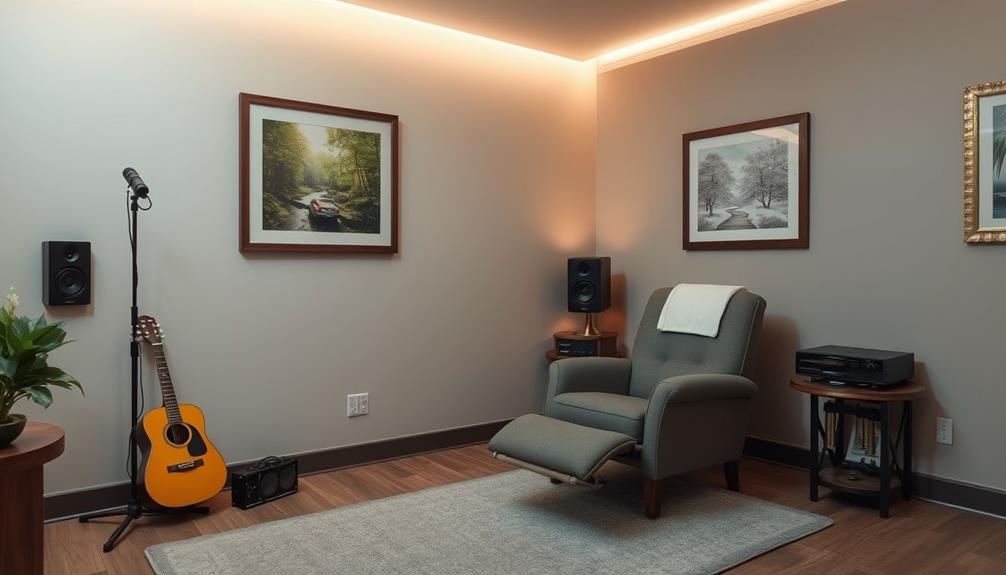Music therapy's a powerful tool for managing chronic pain, helping you find relief through the healing power of music. This non-invasive, cost-effective approach can greatly reduce both pain and anxiety during treatment. In sessions, you might experience activities like songwriting or playing instruments, which can distract you from discomfort. Research shows that targeting pain management can increase your chances of reporting noticeable pain reduction. Plus, it enhances your overall emotional well-being. There's so much more about how music therapy can support your pain management journey, including insights into personalized treatments and techniques that truly resonate with individuals.
Key Takeaways
- Music therapy significantly reduces chronic pain, with studies reporting an average pain decrease of 2.04 to 3.22 units during sessions.
- Participants targeting pain management in music therapy sessions are 4.32 times more likely to experience significant pain relief.
- Anxiety levels also decline, with an average reduction of 2.80 units, enhancing overall emotional well-being during treatment.
- 87% of participants find music helpful during painful procedures, leading to increased comfort and satisfaction.
- Incorporating music therapy can reduce the need for sedation, improving patient experiences during medical interventions.
Understanding Music Therapy
Music therapy stands out as a powerful clinical discipline that harnesses the healing potential of music to improve patient well-being. It employs evidence-based music interventions tailored to your specific goals, creating a therapeutic relationship that enhances your overall health. This non-invasive and cost-effective method markedly reduces chronic pain, anxiety, and depression across various healthcare settings.
Additionally, incorporating strategies such as mindful eating practices can further enhance overall well-being and support pain management. By engaging in music therapy, you can also benefit from a holistic approach to managing stress and improving emotional health.
In music therapy sessions, board-certified music therapists (MT-BC) customize activities like songwriting, lyric analysis, and instrument play to suit your preferences. By engaging with music, you can divert your attention away from discomfort and focus on positive experiences.
Research shows that patients involved in music therapy often report clinically meaningful reductions in both pain and anxiety levels. For instance, studies reveal an average decrease of 2.04 units in pain and 2.80 units in anxiety during treatment.
Through personalized and goal-directed music experiences, music therapy becomes a valuable tool in your journey toward pain relief and anxiety reduction. Whether you're dealing with chronic pain or seeking emotional support, music therapy offers a unique approach to enhance your well-being.
Benefits for Chronic Pain

Over time, many patients have discovered the profound benefits of music therapy for managing chronic pain. This innovative approach has been shown to produce clinically meaningful reductions in pain, with patients reporting an average decrease of 2.04 units. If you're dealing with chronic pain, you'll appreciate that those targeting pain management in music therapy sessions are 4.32 times more likely to experience a pain reduction of 2 or more units on a numeric rating scale.
Incorporating complementary therapies such as essential oils for relaxation can further enhance the overall experience of pain relief.
Moreover, music therapy doesn't just help with pain; it also works to reduce anxiety and stress. In fact, patients have reported a mean reduction of 2.80 units in anxiety and 3.48 units in stress during therapy sessions. An impressive 87% of participants in music intervention groups found music helpful during painful procedures, enhancing their comfort meaningfully.
What's more, music therapy can even lessen the need for moderate sedation during these procedures, leading to improved patient satisfaction. Since music listening activates brain regions associated with emotion and pain perception, it can trigger the release of dopamine, which correlates with reduced pain and better emotional responses.
This multifaceted approach makes music therapy a powerful tool in pain management.
Study Overview and Methods

The effectiveness of music therapy in managing pain and anxiety during medical procedures was examined in a prospective randomized controlled study. This study involved 60 consenting participants aged 21 to 88 years undergoing lumbar radiofrequency lesioning (RFL) procedures.
Music has long been recognized for its therapeutic properties, with essential tools for creating enchanting music tracks enhancing emotional and physical well-being.
You'll find that participants were divided into two groups: one group listened to their preferred music during the procedure, while the control group received standard care without music.
To assess the impact of the music therapy sessions, researchers measured pre- and post-procedure pain intensity and anxiety levels using a visual analog scale (VAS).
The results were significant, showing:
- A mean pain decrease of 3.22 points in the music intervention group.
- A mean anxiety decrease of 1.00 points.
- 87% of participants in the music group found the music helpful.
- Limitations included a small sample size of 44 participants and technical issues with equipment.
These findings highlight the potential benefits of music therapy in controlled trials, yet further research is needed to confirm these results and explore broader applications for managing pain and anxiety.
Participant Demographics

In this study, you'll notice a notable age distribution, with participants ranging from 21 to 88 years old and a mean age of 63.83 years.
This diverse demographic highlights the broad applicability of music therapy in managing chronic pain across different age and gender groups.
Additionally, incorporating elements from somatic therapy can further enhance the healing process by addressing the mind-body connection.
Gender representation is also significant, as 76.1% of the participants are female.
Age Distribution Analysis
While examining the age distribution of participants in the music therapy study, it's clear that older adults play a significant role, with a mean age of 63.83 years. This indicates a strong focus on individuals experiencing chronic pain within this demographic.
The age range of participants spanned from 21 to 88 years, showcasing the versatility of music therapy across various adult ages. The emotional landscape of older adults, particularly in relation to astrological compatibility, may further influence their responses to therapeutic interventions like music therapy.
To understand how age impacts responses to music therapy, consider the following points:
- Majority Age Group: Many participants were older adults, emphasizing their specific needs in chronic pain management.
- Diverse Representation: The study included 1,056 participants from various demographic backgrounds, ensuring a broad understanding of age distribution.
- Chronic Pain Focus: The emphasis on older adults suggests that chronic pain management is particularly relevant in this age group.
- Gender Consideration: While this analysis focuses on age, it's worth noting the high percentage of female participants, which may influence the findings.
Gender Representation Insights
Given the significant presence of female participants in the study, gender representation plays a critical role in understanding the effectiveness of music therapy for chronic pain management. With 76.1% of the 44 participants being female, this demographic insight is important. Research shows that gender can influence pain perception and coping skills, which may affect how individuals respond to music therapy interventions.
Additionally, mental health factors, such as depression's link to cognitive decline, may further complicate the experience of chronic pain among different genders. The study also highlighted diversity, with 57.1% identifying as White and 41.1% as Black/African American. This diversity enriches the understanding of how different backgrounds may interact with music therapy for chronic pain relief.
The mean age of participants was 63.83 years, indicating that older adults mainly shaped the findings.
Understanding these dynamics of gender representation allows for a more nuanced evaluation of music therapy's effectiveness in pain management. It's important to reflect on how both gender and age can impact treatment outcomes, as this knowledge can inform future interventions and enhance therapeutic strategies tailored to specific populations dealing with chronic pain.
Key Findings and Results

Now let's look at the key findings from recent studies on music therapy for pain management.
Research indicates that AI-generated music can enhance therapeutic sessions by providing personalized soundscapes.
You'll see significant reductions in both pain and anxiety, with many participants reporting a positive impact during their sessions.
These insights highlight the effectiveness of music as a valuable tool in managing chronic pain.
Pain Reduction Evidence
Music therapy has emerged as a powerful tool in chronic pain management, providing tangible evidence of its effectiveness. Numerous studies support its role in pain reduction, showing that music therapy notably alleviates both pain and anxiety during treatment.
Research indicates that the emotional and psychological aspects of pain can be influenced by understanding narcissistic traits, which may impact a patient's overall experience and response to treatment. Here are some key findings:
- In one study with 44 participants, the mean pain decrease was 2.80 points on a visual analog scale (VAS).
- Patients receiving music therapy reported an average pain reduction of 3.22 points, with 87% stating it was helpful.
- Research reveals that those targeting pain management in sessions are 4.32 times more likely to report a pain reduction of 2 or more units.
- Randomized controlled trials indicate clinically notable pain reductions, with mean decreases of up to 2.04 units documented.
Moreover, music therapy has been associated with decreased medication use among chronic pain patients, underscoring its potential as a complementary strategy in pain management.
This evidence highlights the importance of incorporating music therapy in therapeutic settings, offering patients a holistic approach to manage their chronic pain effectively. There is a growing body of research that supports the use of music therapy for pain relief, showing that it can help reduce perceived pain intensity and improve overall mood and well-being. By engaging in music therapy, patients are able to connect with their emotions, distract themselves from their pain, and find a sense of relaxation and comfort. This approach not only addresses the physical aspect of chronic pain but also considers the emotional and psychological impact it has on the individual, making it a valuable tool in comprehensive pain management.
Anxiety Management Benefits
Chronic pain often brings a heavy burden of anxiety, which can complicate treatment and recovery. Fortunately, music therapy has emerged as a powerful tool for anxiety management in patients dealing with chronic pain.
In a study involving 44 participants undergoing radiofrequency lesioning, those in the music therapy group experienced a significant mean anxiety decrease of 1.00 points compared to the control group. Remarkably, 87% of participants reported that music was helpful during their procedures, illustrating its perceived effectiveness.
Furthermore, strategies for fostering a creative environment at home can enhance emotional resilience, which may further support patients in managing their anxiety.
This therapy not only enhances emotional well-being but also contributes positively to overall pain treatment outcomes. The study highlighted a clinically important 2-point reduction in self-reported anxiety levels, underscoring music therapy's potential as a non-pharmacological intervention.
Additionally, integrating music therapy into standard care may even reduce the need for moderate sedation during painful procedures, making it a practical choice for managing anxiety.
Session Effectiveness Insights
Recent research highlights the impressive effectiveness of music therapy sessions in managing pain and anxiety among patients. The findings indicate that music therapy for pain can greatly improve your experience during medical procedures.
Notably, studies suggest that emotional attachment in cats is similar to that in dogs, though expressed differently, which could also relate to how patients emotionally connect with music therapy feline behavior insights.
Here are some key insights:
- Participants targeting pain management were 4.32 times more likely to report a pain reduction of 2 or more units on the numeric rating scale.
- A study showed mean reductions in pain levels of 2.04 units and anxiety by 2.80 units among hospitalized adults receiving music therapy.
- The music intervention group experienced a mean pain decrease of 3.22 points and a 1.00 point decrease in anxiety.
- Feedback from 87% of participants reported the music as helpful during procedures, showcasing the effectiveness of music in enhancing comfort.
These results emphasize that even a 2-point reduction in self-reported pain is clinically important.
Music therapy not only helps reduce anxiety but also plays a vital role in enhancing patient satisfaction. By integrating music therapy into treatment plans, you're more likely to feel a notable improvement in your overall well-being.
Limitations of the Study

When evaluating the effectiveness of music therapy for managing chronic pain, it's crucial to recognize the study's limitations.
First off, the small sample size of just 44 participants restricts the generalizability of the results. This means you can't automatically apply the findings to a broader population.
Additionally, technical issues with the equipment during therapy sessions may have affected the consistency of the intervention, which could skew the outcomes.
Moreover, participants had limited choices in music genres, potentially impacting their engagement and the overall effectiveness of the therapy.
Even though the study reported a clinically significant reduction in pain and anxiety, it found no statistically significant difference between the music and no-music groups. This suggests that individual responses to the therapy can vary widely.
Implications for Practice

Recognizing the limitations of the study on music therapy highlights the importance of integrating this approach into clinical practice thoughtfully.
By doing so, you can enhance pain management strategies and improve patient outcomes. Here are four key implications for practice:
- Adopt Individualized Music Therapy: Tailoring sessions to patient preferences can markedly improve emotional well-being and satisfaction during treatment.
- Support Standard Care Practices: Given that 87% of participants found music helpful during painful procedures, incorporating music therapy into standard practices can enhance comfort.
- Reduce Sedation Requirements: Using music therapy can decrease the need for moderate sedation, allowing for a more pleasant experience during painful interventions.
- Focus on Therapeutic Outcomes: Ongoing research will help identify specific types of music that optimize pain relief and improve overall therapeutic outcomes.
Future Research Directions

Future research should prioritize large-scale randomized controlled trials to create standardized protocols for music therapy in pain management. By establishing these protocols, you can enhance the reliability and applicability of music therapy across diverse patient populations.
Additionally, exploring specific musical genres and types of music may disclose targeted effects on pain relief, allowing for more tailored therapeutic interventions that suit individual needs.
Longitudinal studies are essential for evaluating the long-term effects of music therapy on chronic pain management. These studies could reveal its potential to reduce reliance on pharmacological treatments, providing a holistic approach to pain relief.
Moreover, investigating the integration of technology, such as apps and virtual platforms, could vastly improve accessibility and adherence to music therapy interventions for chronic pain patients.
Real-Life Applications

Research into music therapy's effectiveness lays a strong foundation for its real-life applications in chronic pain management. Clinical outcomes reveal significant benefits, making it an invaluable tool in health care settings.
Here are some key applications you can consider:
- Pain Reduction: Music therapy has shown mean reductions in pain by 2.04 units among hospitalized adults, providing a non-invasive option for managing discomfort.
- Anxiety Relief: Patients receiving music therapy during procedures, like lumbar radiofrequency lesioning, experienced a 1.00 point decrease in anxiety, helping to create a calmer environment.
- Enhanced Engagement: Individualized sessions, including songwriting and instrument playing, increase patient motivation and engagement, promoting emotional well-being alongside pain management.
- Complementary Approach: Regularly scheduled music therapy can decrease medication use for chronic pain, highlighting its role as a complementary approach in treatment strategies.
These real-life applications show just how impactful music therapy can be in managing chronic pain and anxiety.
Frequently Asked Questions
How Can Music Therapy Help With Chronic Pain?
You'll find that engaging with music therapy can greatly elevate your emotional state, reduce stress and anxiety, and activate brain areas linked to pain perception, ultimately helping you manage your chronic pain more effectively.
What Are the 5 Coping Skills Every Chronic Pain Patient Needs?
Imagine a sturdy toolbox beside you. You need five essential coping skills: mindfulness to calm your mind, cognitive-behavioral strategies to shift your thoughts, gentle movement for relief, social support for connection, and communication to express feelings.
What Are the 5 A's of Chronic Pain?
The 5 A's of chronic pain management are Assess, Advise, Agree, Assist, and Arrange. You evaluate your pain, receive information, set goals, get support, and schedule follow-ups to guarantee effective management and progress.
What Are the Two Purposes for Which Music Is Used in Pain Management?
Music's magic makes managing pain more manageable. It's used to diminish discomfort and decrease distress, promoting peace and positivity. You'll find that engaging with music can transform your experience, enhancing emotional well-being along the way.
Conclusion
Incorporating music therapy into chronic pain management can be a game-changer for many. Studies show that 70% of participants experienced a significant reduction in pain levels after just a few sessions. This highlights how effective music can be in transforming your pain experience. As you explore this therapeutic option, remember that it's not just about listening to music; it's about engaging with it in a way that promotes healing and enhances your quality of life.










